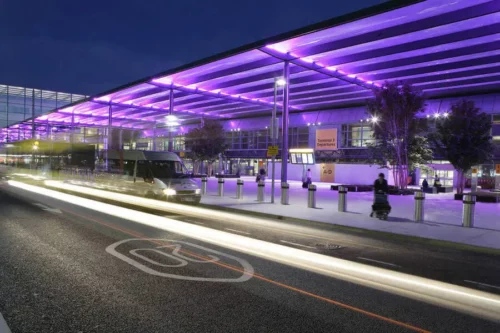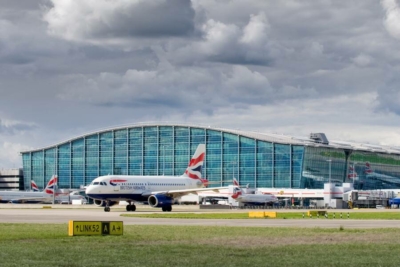The CAA proposes new fees for using Heathrow – and airlines are not happy
Links on Head for Points may support the site by paying a commission. See here for all partner links.
The on-going battle between Heathrow Airport and the UK Civil Aviation Authority (CAA) over what it can charge airlines – which falls straight through to the price of your ticket, as one of the ‘taxes and charges’ you pay – has entered its next phase.
Heathrow believes that, since its income is effectively capped by the CAA at below the market rate, it deserves some retrospective protection for the drop in income last year. That said, it still reportedly paid out a £106m dividend to its shareholders and did not need to raise new equity.
The airlines believe that Heathrow has a de facto monopoly on premium air travel in London and should be constrained appropriately, for the benefit of passengers and the wider economy.

As we covered earlier this year, Heathrow Airport has already added an £8.90 surcharge to all tickets issued.
It is fully within its rights to do this, since there is an agreement with the airlines that guarantees a minimum income level to cover the cost of running certain facilities. This income level was not reached in 2020 and the £8.90 surcharge will continue until the difference is made up.
Heathrow’s original proposal to the CAA was for the Passenger Service Charge to increase like this:
- domestic charges increased from £10.98 in 2021 to £12.26 in 2022
- short haul charges increased from £15.98 in 2021 to £19.76 in 2022
- long haul charges increased from £38.33 in 2021 to an astonishing £67.86 in 2022
This won’t be happening.
However, an interim price control averaging £29.50 per passenger is proposed from January 2022. This is up sharply from the current average of £22 per passenger. This interim figure will operate until Summer 2022 when the new five year charging period will begin.
What has the CAA proposed?
The UK Civil Aviation Authority published its thoughts for the 2022-2027 charging period yesterday. It suggests:
- a (hugely vague) average charge of somewhere between £24.50 to £34.40, compared to the current average of £22 per passenger (the original Heathrow proposal above averages out at £38 per passenger)
- an interim price cap of £29.50 to be put in place for Spring 2022 whilst discussions continue
- no additional one-off adjustments on top of the £300 million of additional asset base increase that was allowed earlier this year. This means that Heathrow’s request for a payment of £2,300 million to cover its covid losses (paid via an increase in Regulatory Asset Base) will not happen.
- an agreement to cap both the upside and downside to Heathrow of actual passenger levels versus forecast levels over the next five years

The CAA was very positive about it’s proposals. CEO Richard Moriarty said:
“While international air travel is still recovering, setting a price control for Heathrow Airport against the backdrop of so much uncertainty means we have had to adapt our approach. Our principal objective is to further the interests of consumers while recognising the challenges the industry has faced throughout the Covid-19 pandemic. These initial proposals seek to protect consumers against unfair charges, and will allow Heathrow to continue to appropriately invest in keeping the airport resilient, efficient and one that provides a good experience for passengers.”
That is one view. Shai Weiss, CEO of Virgin Atlantic, went batshit crazy:
“Today’s initial proposals from the Civil Aviation Authority fail to protect the British consumer, paving the way for Heathrow Airport to introduce unacceptable charges, just as international travel resumes at scale. The world’s most expensive airport risks becoming over 50% more expensive, as Heathrow and its owners seek to recoup their pandemic losses and secure hundreds of millions in dividends to shareholders. It is concerning that the regulator has failed in its first opportunity to step in, and together with industry partners, we will oppose these proposals in the strongest terms to protect passengers.
“Abusing its unique position as the UK’s only hub airport, Heathrow’s proposed increase of charges will hurt the UK’s economic recovery and unfairly hit the pockets of families and businesses around the nation. No other airport in the world is proposing increases on this scale and by becoming unaffordable, competing EU hubs and airlines will benefit.”
Even the CAA admits, in the consultation document, that:
“Increases towards the upper end of our range could cause material consumer detriment.”
Virgin Atlantic claims that the CAA is unduly pessimistic in assuming a 44% fall in passenger numbers in 2022 versus 2019. This is, however, more optimistic than the forecast submitted by Heathrow. Virgin Atlantic believes that passenger numbers are likely to be down by just 5% on 2019 levels.
The CAA proposals are not set in stone. Two industry consultations will now take place, on the interim 2022 price cap and the wider proposals, before the final figures are published.
One upside is that the CAA admits that ‘gold plating’ needs to end. At present, because Heathrow’s agreed returns are based on what it invests in the airport, there is an incentive to – literally – gold plate the toilets if allowed. The more it spends, the more it can earn. The CAA says:
“we consider that stronger incentives are needed to protect the interests of consumers from the increased costs that they would otherwise face were HAL to make inefficient capex investments.”









Comments (72)